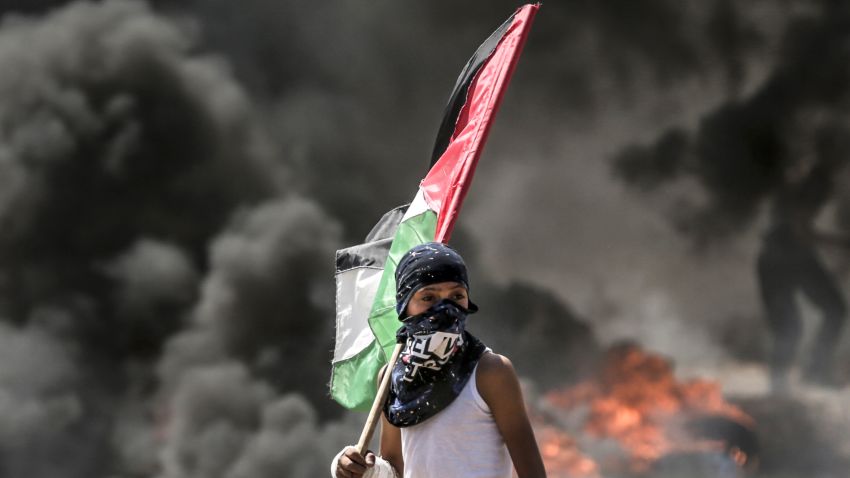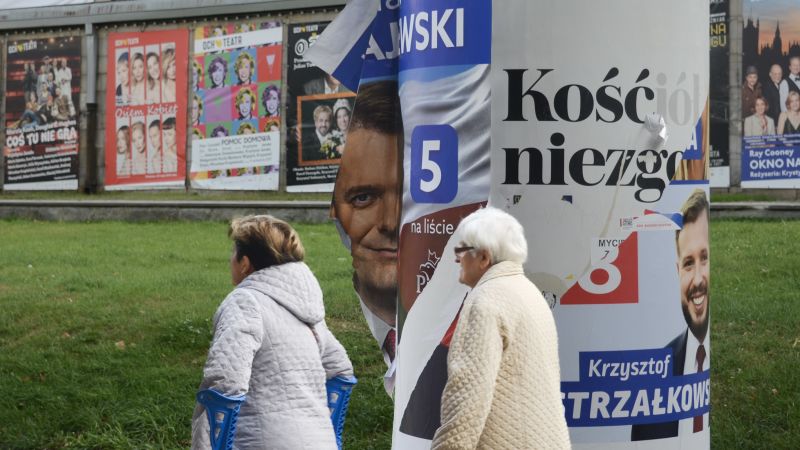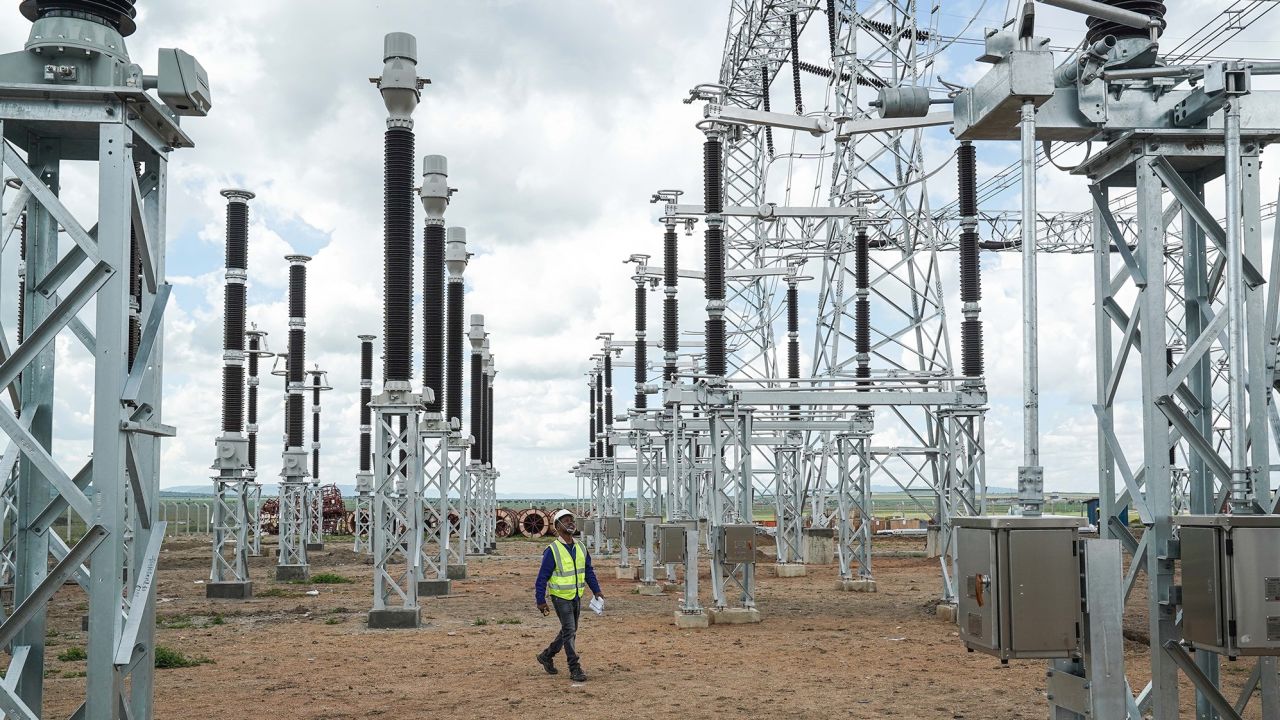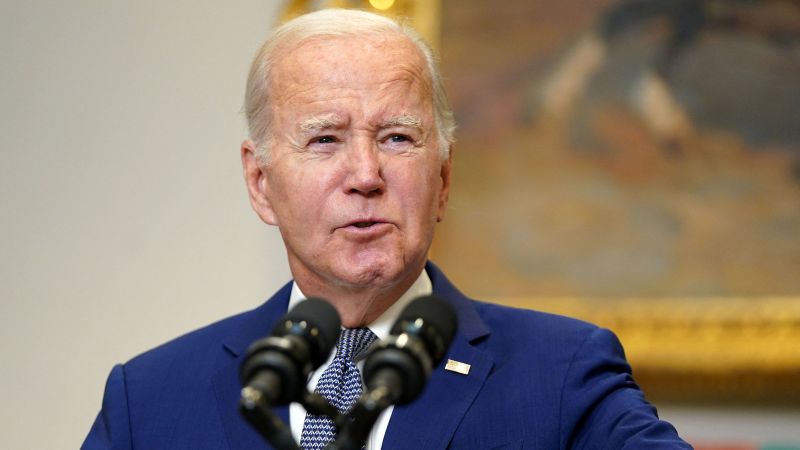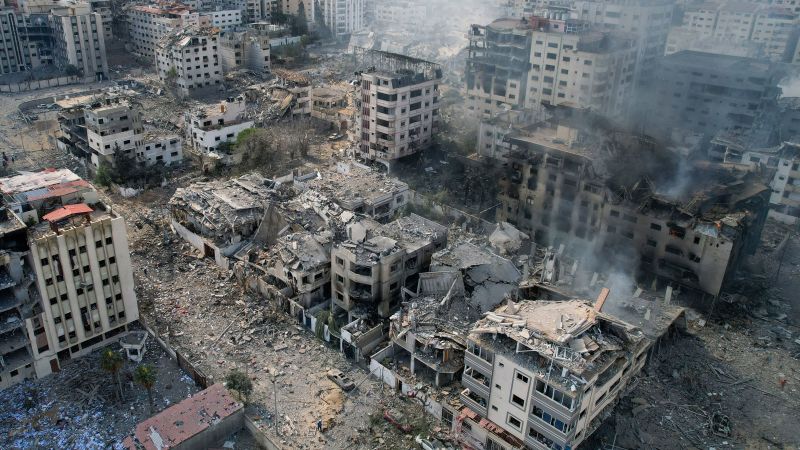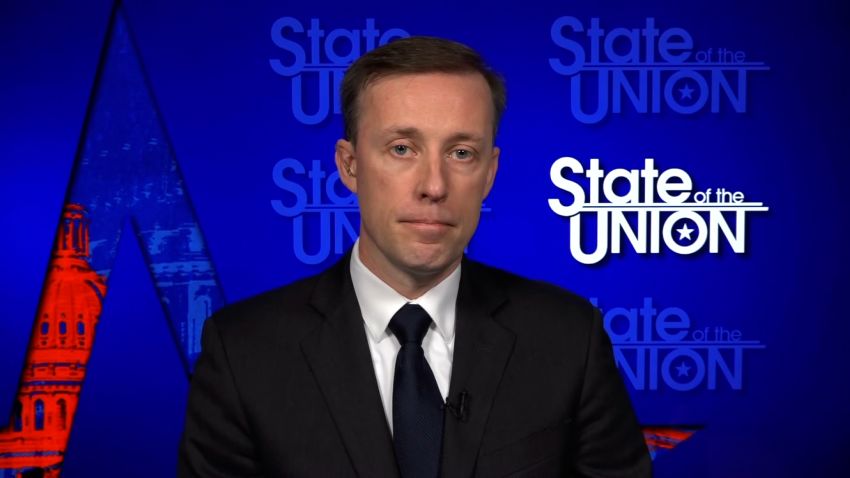Editor’s Note: A version of this story appears in CNN’s Meanwhile in the Middle East newsletter, a three-times-a-week look inside the region’s biggest stories. Sign up here.
CNN
—
The Israeli military has told all civilians in Gaza City to evacuate “southwards” as it maintains its bombardment of the coastal enclave in response to last weekend’s Hamas attacks that killed more than 1,400 people.
Evacuating would involve moving more than 1.1 million people from the north to the south of the besieged enclave, amid constant airstrikes – a task that the United Nations says is dangerous and unfeasible.
Israeli war planes have been pounding Gaza for a week, leveling entire neighborhoods, including schools and mosques. Israel says it strikes Hamas targets and that the group has used civilians as human shields.
Israel’s assault has killed at least 2,670 people in Gaza, and injured more than 9,600 others. Nearly 1 million Palestinians in Gaza have been forced from their homes, the UN has said.
Here’s what we know so far.
Militants from Gaza fired thousands of rockets towards Israeli towns on October 7, before breaking through the heavily fortified border fence with Israel and sending militants deep into Israeli territory. There, Hamas gunmen killed more than 1,400 people, including civilians and soldiers, and took up to 150 hostages, according to Israeli authorities.
The attacks were unprecedented in tactics and scale as Israel has not faced its adversaries in street battles on its own territory since the 1948 Arab-Israeli war. It has also never faced a terror attack of this magnitude that has taken the lives of so many civilians. While Hamas has kidnapped Israelis before, it has never before taken dozens of hostages at once, including children and the elderly.
A senior Hamas official in Lebanon told a Russian state-backed channel that the group had been preparing for the attack for two years.
Hamas called the operation “Al-Aqsa Storm” and said that it was a response to what it described as Israeli attacks on women, the desecration of the al-Aqsa mosque in Jerusalem and the ongoing siege of Gaza.
They said the bodies of some 1,500 Hamas fighters had been recovered inside Israel since Saturday’s assault.
In response to the attack, Israel has declared war and launched “Operation Swords of Iron,” striking what it says are Hamas and Islamic Jihad targets in Gaza. It has also blocked supply lines of basic necessities to the Gaza population, including fuel and water.
Between October 7 and 12, Israel dropped 6,000 bombs on the densely inhabited territory – that’s equivalent to the total number of airstrikes on Gaza during the entire 2014 Gaza-Israel conflict, which lasted 50 days.
Children make up “between 30% and 40% of the wounded” in Israel’s airstrikes on Gaza, British-Palestinian surgeon Ghassan Abu-Sittah told CNN’s Christiane Amanpour on Thursday.
The IDF has told civilians in Gaza to leave their residential areas immediately for their safety, but some say there is nowhere safe to go. All crossings out of Gaza have been shut.
Israeli Minister of Defense Yoav Gallant said on Monday that he had ordered a “complete siege” on Gaza, blocking delivery of electricity, food, fuel and water. Energy Minister Israel Katz has said supplies will remain cut off until hostages being held by Hamas are freed.
Israel on Wednesday formed an emergency government and war management cabinet.
On Friday, Israel’s military told the 1.1 million people in northern Gaza to evacuate their homes immediately.
CNN has geolocated and authenticated five videos from the scene of a large explosion along one of the evacuation routes for civilians south of Gaza City.
The videos show many dead bodies amid a scene of extensive destruction. Some of those bodies are on a flat-bed trailer that appears to have been used to carry people away from Gaza City. They include several children. There are also a number of badly burned and damaged cars.
It’s unclear what caused the widespread devastation; the explosion occurred on Salah al-Deen Street on Friday afternoon.
IDF spokesman Lt. Col. Peter Lerner told CNN in an interview on Sunday that the Israeli military did not strike the convoy on Salah Al-Deen street.
A humanitarian crisis in Gaza is rapidly spiraling amid warnings that peosple are at risk of starvation as Israel tightens its chokehold on the territory.
The Gaza Strip is one of most densely populated places on earth, with some 2 million people crammed in 140-square-mile territory. The enclave lies on Egypt’s western border and has been under blockade since Hamas seized control in 2007.
The Israeli air, naval and land blockade on the territory, as well as the Egyptian land blockade, continue today.
The enclave’s only power station stopped working on Wednesday. Hospitals are expected to run out of fuel, leading to “catastrophic” conditions, the Palestinian Health Ministry warned. The World Health Organization (WHO) has said that hospitals are at “breaking point.”
On Thursday, the International Committee of the Red Cross warned hospitals in Gaza “risk turning into morgues” as they lose power. Airstrikes have hit at least 88 education facilities and killed 12 UN personnel, according to the UN.
The Palestine Red Crescent has warned of a “humanitarian catastrophe” as there are “no safe areas” to evacuate civilians to, after Israel told half the population to migrate south. It described the Israeli evacuation call as “shocking and beyond belief.”
Human rights groups have meanwhile warned of possible war crimes being committed by Israel in Gaza. Amnesty International on Friday urged Israel to “immediately” lift its blockade on the enclave, saying the “collective punishment” of civilians for Hamas’ terrorist atrocities amounts to a war crime.
Since Israel shut its two crossings with Gaza, the only corridor through which Palestinians or aid can pass in and out of the territory is the Rafah Crossing, which connects the south of the enclave to Egypt. But it’s unclear whether that crossing is open.
Egyptian Foreign Minister Sameh Shoukry said on Saturday that the crossing is open but aerial bombardment has rendered the roads on the Gaza side “inoperable.”
Aid flights from Jordan, Turkey, the United Arab Emirates, the World Health Organization, and the Red Cross have arrived in Egypt, but the supplies have not yet made it through the crossing. Shoukry said Egypt has tried to ship humanitarian aid to Gaza but has not received the proper authorization to do so.
Hamas said on Friday that 13 Israeli hostages held in Gaza have been killed by “random” Israeli bombings on the enclave over the past 24 hours. The Israel Defense Forces (IDF) said it could not confirm or deny the claim.
Hamas also called on Gazans not to leave their homes, accusing Israel of engaging in “psychological warfare” by sending messages telling Palestinian civilians and employees of international organizations to evacuate to the south. “Displacement and exile are not for us,” Hamas said.
The United Nations Relief and Works Agency (UNRWA) on Friday said it had relocated its central operations center and international staff in Gaza to the south of the besieged enclave.
Hamas is an Islamist organization with a military wing that came into being in 1987, emerging out of the Muslim Brotherhood, a Sunni Islamist group that was founded in the late 1920s in Egypt.
The group, like most Palestinian factions and political parties, insists that Israel is an occupying power and that it is trying to liberate the Palestinian territories. It considers Israel an illegitimate state and has called for its downfall.
Unlike some other Palestinian factions, Hamas refuses to engage with Israel. In 1993, it opposed the Oslo Accords, a peace pact between Israel and the Palestine Liberation Organization (PLO) that saw the PLO give up armed resistance against Israel in return for promises of an independent Palestinian state alongside Israel. The Accords also established the Palestinian Authority (PA) in the Israeli-occupied West Bank.
Hamas presents itself as an alternative to the PA, which has recognized Israel and has engaged in multiple failed peace initiatives with it. The PA, whose credibility among Palestinians has suffered over the years, is today led by President Mahmoud Abbas.
It has over the years claimed many attacks on Israel and has been designated as a terrorist organization by the United States, the European Union and Israel. Israel accuses its archenemy Iran of backing the group.
Hamas rules Gaza, the small strip of land bordering Israel and Egypt that has changed hands several times over the past 70 years. The vast majority of its population are descendants of refugees who were either expelled or forced to flee their homes in 1948 in what is now Israel.
Tensions between Israelis and the Palestinians have existed since before Israel’s founding in 1948. Thousands of people on both sides have been killed and many more injured over decades.
Violence has been particularly acute this year. The number of Palestinians – militants and civilians – killed in the occupied West Bank by Israeli forces since the year began is the highest in nearly two decades. The same is true of Israelis and foreigners – most of them civilians – killed in Palestinian attacks.
Israel captured Gaza from Egypt in the 1967 war, then withdrew its troops and settlers in 2005. The territory, home to some 2 million Palestinians, fell under Hamas’ control in 2007 after a brief civil war with Fatah, a rival Palestinian faction that is the backbone of the Palestinian Authority.
After Hamas seized control, Israel and Egypt imposed a strict siege on the territory, which is ongoing. Israel also maintains an air and naval blockade on Gaza.
Human Rights Watch has called the territory an “open-air prison.” More than half of its population lives in poverty and is food insecure, and nearly 80% of its population relies on humanitarian assistance.
The history of Gaza in 2 minutes
Hamas and Israel have fought several wars. Before Saturday’s operation, the last war between the two was in 2021, which lasted for 11 days and killed at least 250 people in Gaza and 13 in Israel.
Saturday’s assault occurred 50 years almost to the day since the 1973 war, when Israel’s Arab neighbors launched a surprise attack on Israel on Yom Kippur, the holiest day in the Jewish calendar, on October 6, 1973.
Israel is now on a war footing and has amassed more than 300,000 reservists along the Gaza border for a potential ground operation. It has said that it will exact a heavy price on Hamas for its attack and plans to retrieve Israeli hostages from the territory.
Israel has dealt with hostage situations before, but never at this scale. In the past, militants have mostly demanded the release of prisoners held in Israeli jails in exchange for captured Israelis. In 2011, Israel traded 1,027 Palestinians for Israeli soldier Gilad Shalit, and in 2004, it released more than two dozen Lebanese and Arab prisoners – including two senior Hezbollah officials – for Elhanan Tannenbaum, an Israeli businessman and army reserve colonel, as well as the bodies of three IDF soldiers. In 2008, Israel released five Palestinian prisoners, five Lebanese prisoners and returned the bodies of nearly 200 Arab fighters in exchange for the bodies of two Israeli soldiers.
Hamas has captured at least 150 hostages. Their presence in Gaza will undoubtedly complicate any Israeli military operation there.
The militant group’s armed wing said Monday it would begin killing civilian hostages and broadcasting the act if Israel targets people in Gaza without warning. It isn’t clear if it has acted on those threats yet.
The IDF has said that it plans to take control of the Gaza Strip. Its spokesperson, Lt. Col. Richard Hecht, said the aim is to “end the Gaza enclave” and “control the entire enclave.”
When asked whether it had stopped the “knock on the roof,” which is the Israeli military’s warning for civilians before it bombs a building. Hecht responded that Hamas did not “knock on the roof.”
“When they came in and threw grenades at our ambulances they did not knock on the roof. This is war. The scale is different,” Hecht said.
Senior Hamas member Saleh al-Arouri told Al Jazeera Arabic on Saturday that Hamas is ready “for all options, including a war and an escalation on all levels.”
“We are ready for the worst-case scenario, including a ground invasion, which will be the best for us to decide the ending of this battle,” al-Arouri said.
Hamas’ operation was carried out in a sophisticated and coordinated manner and would have taken a significant amount of planning. Speculation has been rife that the group may have received assistance from abroad, which, if proven, could raise the specter of a wider regional war.
Israel says Iran supports Hamas to the tune of some $100 million dollars a year. The US State Department in 2021 said that the group receives funding, weapons, and training from Iran, as well as some funds that are raised in Gulf Arab countries.
“Of course Iran is in the picture,” one US official told CNN. “They’ve provided support for years to Hamas and Hezbollah.”A senior Biden administration official said on Saturday that it was too early to say whether Iran was directly involved in the attack, but that Washington will be tracking the matter “very closely.”
But President Joe Biden on Wednesday issued a stark warning to Iran to “be careful” around its actions in the region.
Iranian President Ebrahim Raisi spoke to Hamas leader Ismail Haniyeh by phone last Sunday and later congratulated the Palestinian people for their “victory” over Israel. On Monday, however, Iran’s mission to the United Nations said the Islamic Republic was “not involved in Palestine’s response,” referring to the Hamas attack. “It is taken solely by Palestine itself,” it said.
On Friday, Iranian Foreign Minister Hossein Amirabdollahian said in Beirut that “Lebanon’s security is Iran’s security,” in an apparent warning to Israel not to strike Lebanon or the Iran-backed Hezbollah militant group that operates there.
He said that Western officials had asked him if new fronts could open against Israel, adding that it’s “probable” that members of the “resistance” against Israel could enter the war “with the continuation of Israeli war crimes.”
The warning came a day after the Iran-allied Syrian regime said that Israel struck Damascus and Aleppo airports, rendering them non-operational.
US Secretary of State Antony Blinken has meanwhile been shuttling around the region, visiting Israel, the occupied West Bank and Jordan. Defense Secretary Lloyd Austin also arrived in Israel on Friday.
The US has ordered two carrier strike groups to the eastern Mediterranean Sea, Austin said on Saturday. A US official told CNN that the US is also sending more fighter jets to the Middle East to deter any Iranian potential aggression or an expansion of the fighting beyond Israel’s borders.
Israel may also face the threat of new fronts opening in the war. Of its immediate neighbors, it is only at peace with Jordan and Egypt, and is officially in a state of war with Lebanon and Syria. Israel has said it is ready in case there are attacks from those two countries.
The Lebanese militant group Hezbollah, which is backed by Iran, has praised Hamas’ attack and said it is in contact with Palestinian militant groups “at home and abroad,” its Al Manar channel said. The group claimed responsibility for targeting three Israeli sites in an area known as Shebaa Farms using missiles and artillery. The area is considered by Lebanon as Israeli-occupied. Israel responded by firing artillery.
On Monday, the IDF said it killed a “number of armed suspects” who infiltrated into Israel from Lebanon and that soldiers were searching the area. Lebanese Prime Minister-designate Najib Mikati said on Monday that his country doesn’t want to be drawn into the conflict.
The IDF said Wednesday a report was received regarding a suspected “infiltration from Lebanon into Israeli air space.”
It did not provide further details and it was unclear whether the infiltration involved aircraft, drones, gliders, balloons or people.




